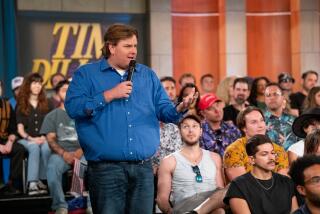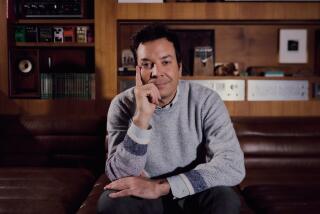CHARLIE ROSE : Smart Talk
Nighttime seems to be the right time for Charlie Rose, who gained a loyal wee-hours following during his 1984-90 stint as the anchor of CBSâ âNightwatch.â After an unhappy six-month foray into tabloid television as host of Foxâs âPersonalities,â Rose hooked up with PBSâ New York affiliate, WNET. For the past 15 months, the Emmy-winning journalist has hosted--and executive-produced--the hourlong late-night interview program âCharlie Rose,â which makes its national debut Monday.
Airing live Monday through Thursday (with Fridayâs show taped in advance), the format offers one to three guests each night; last monthâs subjects ranged from investigative reporter Seymour Hersh to heavyweight boxing champion Riddick Bowe, Louis Malle, Liz Smith, Jon Voight, Henry Kissinger, Bill Cosby, Jimmy Breslin and the cast of Wendy Wassersteinâs off-Broadway hit âThe Sisters Rosensweig.â
A native of North Carolina and a graduate of Duke University, Rose, 51, entered TV journalism full-time in 1974 as managing editor of âBill Moyersâ International Report.â In 1976, he became a correspondent for the weekly PBS magazine series âUSA: People and Politicsâ; later that year he moved to Washington, D.C., as a correspondent for NBC. Subsequent hosting duties included âAM Chicagoâ and âThe Charlie Rose Show.â He talked with writer Janice Arkatov from his New York office.
*
Whatâs the appeal for you in live, late-night broadcasting?
In the beginning, it was because that was the only time I could find a show where people would let me do what I wanted to do--and that was âNightwatch.â
Because of my experience there, I knew there was an audience for interesting conversation. Some people have suggested that what we do is high-brow television, but itâs not at all .
I donât think Iâm the smartest host on television--thatâs probably (David) Letterman. There are a lot of people who are just as bright. But I do seem to attract a lot of smart people on my show, because I think smart people are always interesting, have something to say, and make good conversation.
*
So you donât think of the after-hours time slot as a detriment?
Not at all! Late-night is certainly where the action is; everyone wants to dive in there now. We feel very happy about it, because I think weâve carved out a niche for ourselves--without fanfare, without bands or announcers or sidekicks or a lot of hype. We just offer up the most interesting people. They come in, sit at a round table with me and talk about their movies or their medical discoveries or their politics or their religion.
*
How do you pace yourself so that youâre at your best between 11 p.m. and midnight?
I get up between 7 and 8 a.m., and I stay in my apartment--which is about five minutes from the studio--reading the papers, about six or seven of them. I come into the office between 9 and 10, have meetings until 12 or 1. Then maybe I have a lunch meeting, come back in the afternoon, and I begin to think about the show that night.
At 6, I go out and exercise or play tennis. Then Iâm back at 7 and I take a nap: no less than 20 minutes, no more than 50. Then I get a shower, have dinner. Iâm back to the studio about 10:30, go to makeup, and do the show from 11 to midnight. At 12 I maybe meet with some staff members, go home around 1, and go to bed around 2.
*
How do your determine the length of each segment?
Itâs never written in concrete that we donât go beyond the allotted time for a particular guest. (Former Israeli foreign minister) Abba Eban was roughly scheduled for 12 minutes, and he went for 15 or 16. We can do that because itâs public television--itâs not news, weather and sports. Thereâs no huge production number you have to get on; itâs not like â60 Minutes,â which is prepackaged pieces.
Our show is live, and thereâs enormous flexibility. I think itâs as loose as you can get and still avoid chaos. (He laughs.) Itâs a highly prepared show, but our preparation is not so much (about) structure as knowing as much as we can about each particular guest--so we can tap into their passion.
*
Even with that preparation, there must be some people--and areas of interest--that are more comfortable for you than others.
Politics is my area of expertise. Science and the economy--those are the two I have to do the most background work on; theyâre the hardest for me. Take Dr. (Thomas E.) Starzl the other night. I didnât know a whole lot about transplanting baboon livers; Iâd never run into that before. So I read a lot of stuff, prepared well. For me, preparation is a comfort zone. From preparation flows spontaneity and everything else.
âCharlie Roseâ airs Monday-Friday at 11 p.m. on KCET and at 4:30 p.m. on KPBS.
More to Read
The complete guide to home viewing
Get Screen Gab for everything about the TV shows and streaming movies everyoneâs talking about.
You may occasionally receive promotional content from the Los Angeles Times.






